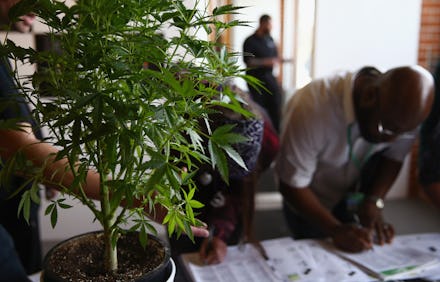Colorado Voters Give the Green Light to Using Legal Weed Money to Build Schools

For most progressives, the most exciting results of Tuesday's off-year elections were the pioneering ballot measures passed in Maine and Seattle in favor of cleaner and fairer elections. But in the state of Colorado, a quirky technical vote on tax revenue should probably have them feeling just as thrilled.
Colorado voters overwhelmingly approved a ballot initiative that gives the state's lawmakers the green light to spend tens of millions of dollars in tax revenue generated through the sale of legal marijuana.
Had the results gone the other way, it would have initiated a $25 million rebate for the state's taxpayers and over $40 million in tax breaks for marijuana growers and recreational users, according to the Denver Post. Instead, the money will now be reinvested in public infrastructure spending, with the bulk of the money allocated for the construction of new schools.
The measure: The reason the vote is odd is that the state should never have needed this new seal of approval — it should have had authority to spend the money reaped from marijuana sales from past laws establishing the tax model. But state tax analysts underestimated the revenue that would be flowing into state coffers from marijuana sales, and lawmakers found themselves sitting on a growing pile of cash without the legal authority to do anything with it.
Both Republican and Democratic lawmakers panicked at the prospect of having to refund the new windfall back to taxpayers, but fortunately for them the new ballot measure securing the money for their use has passed with ease.
On the surface, the vote represents a correction of a technical error. But from a broader perspective, it also marks an affirmation of the broader project of legalization and taxation in the state. Marijuana has been on sale since the beginning of 2014 in Colorado, and there's been plenty of time for the state's residents to grow disillusioned with the ease of access, grow concerned about the abundance of the drug in social life and popular culture, or simply view the sales taxes as overly onerous (recreational marijuana is taxed at a rate of around 13%). But voters have determined that the taxes are at the very least tolerable, and that they'd like to see the money raised by it go to good use.
The funds will be spent as originally intended — primarily on education and programs related to drug education. According to the Denver Post, the measure allocates $40 million for school construction, $12 million for youth and substance-abuse programs, and about $14 million to discretionary accounts.
Earlier this year, Colorado became the first state in the country to raise more tax revenue from marijuana sales than from alcohol.
Colorado is still early on in its big experiment with marijuana, and a whole host of effects on public health and statewide drug use have yet to be understood. But this is much is clear: Green makes green.